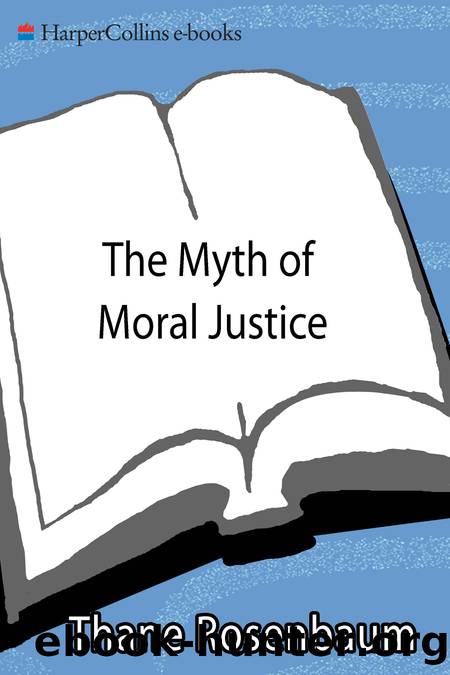The Myth of Moral Justice by Thane Rosenbaum

Author:Thane Rosenbaum
Language: eng
Format: epub
Publisher: HarperCollins
Apologies are yet another example of the lawâs forced separation between the legal and the moral. Morally we know we should apologize; legally we know that we are not obligated to, and that there may even be legal consequences to doing so. As individualistic, autonomy-obsessed Americans, we donât like to be asked to do more than legally necessary. Itâs one thing to have to obey the law, itâs quite another to be required to do the right, moral thing. For this reason, we have no need for apologies. They are extra-legal. They reduce our freedom and crimp our styles. An apology compels us to stop what weâre doing and assess the moral dimensions of the damage rather than merely pay the fine.
Guilt and liability are legal terms; responsibility is a moral one. The legal system perks up when laws get violated, not when moral duties get shirked. We send people to jail for their guilt in breaking the law; their moral crime adds no time to the sentence, nor does contrition change the outcome of their punishment. And the wider culture is equally underwhelmed by apologetic, moral gestures. As a nation, collectively, we donât seem to care whether those who are either guilty or liable do anything other than sit in jail, or pay damages. We donât punish people for not offering apologies; in fact, weâre quite comfortable with punishments that are unattached to remorse.
Ultimately, we are a nation of easy forgivers. Itâs uncool to hold grudges, but itâs okay for people to cause unapologetic harm. And we insist that the injured quickly get over their suffering and grievance, to move on so that they donât hold the rest of us back.
âSorryâ is obviously a suckerâs game, not for smooth-operating, fast-talking, street-hustling Americans. In addition to Pete Roseâs lack of remorse, we can add all of those former Enron executives, including CEO Kenneth Lay, none of whom have come forward to issue an apology for the decimation of the company, the deceit of their investors and lenders, and the ruination of the financial lives of so many Enron employees and shareholders. Corporate America always clams up and invokes the Fifth Amendment when financial and ethical laws are broken. The breach of fiduciary duty and the public trust apparently doesnât deserve an explanation. The very people who owe us some answers can never find the personal integrity to speak. And they always remind us that their silence is not of their own choosing. If it were up to them, they would tell us what we need to know, they would proclaim and prove their innocence. But they canât speak, or wonât, on the advice of counsel.
In 2002, in connection with the sexual abuse scandals in the Catholic Church, Cardinal Bernard Law of Boston came forward late, and unconvincingly, in his statements of accountability. Most Church officials didnât even do thatâunapologetically squirming and fudging, but never acknowledging the damage, and the unpardonable violence, done to their parishioners. Apparently they feared that any expression of fault, any gesture of regret, would expose the Church to liability.
Download
This site does not store any files on its server. We only index and link to content provided by other sites. Please contact the content providers to delete copyright contents if any and email us, we'll remove relevant links or contents immediately.
Killers of the Flower Moon by David Grann(3221)
Machine Learning at Scale with H2O by Gregory Keys | David Whiting(2252)
Will by Will Smith(2023)
Guns, Germs and Steel by Diamond Jared(1875)
Borders by unknow(1777)
The Room Where It Happened by John Bolton;(1717)
The Color of Law by Richard Rothstein(1573)
Once Upon a Broken Heart by Stephanie Garber(1460)
Water Rights and the Environment in the United States by John Burch(1410)
Examples & Explanations: Administrative Law by William F. Funk & Richard H. Seamon(1320)
Friends, Lovers, and the Big Terrible Thing by Matthew Perry(1315)
A Short History of War by Jeremy Black(1294)
Pharmacy Practice and The Law by Richard Abood(1252)
HBR's 10 Must Reads 2022 by Harvard Business Review(1250)
That Every Man Be Armed by Stephen P. Halbrook(1233)
The Strength In Our Scars by Bianca Sparacino(1232)
The Guarded Gate by Daniel Okrent(1215)
515945210 by Unknown(1205)
Injustices by Ian Millhiser(1195)
